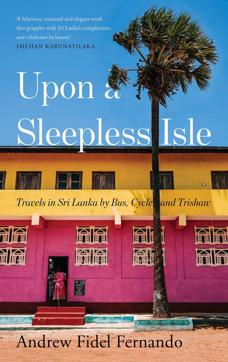Review: Upon a Sleepless Isle by Andrew Fidel Fernando
Andrew Fidel Fernando’s debut has him travelling through his native island on buses, trains and trishaws

Ordinary Indians who have never been to Sri Lanka, on hearing the name of the country, think of Ravan, the civil war, Tamil Tigers, and the tsunami, depending on the circumference of their knowledge. Upon a Sleepless Isle by Andrew Fidel Fernando will definitely make the island a more real place for readers.
This, Fernando’s first book, is an exploration of a country by one of its “woke” citizens. He travels through his country on buses, trains and trishaws (three-wheelers) making a satirical record of everything that catches his eye. He starts with lambasting the lazy bureaucracy and the government and keeps at it throughout. The former colonisers get their share of the blame for spoiling things too. The author also points out what’s lacking in terms of public transport and road networks. Still, readers will find there is much to discover and appreciate about the nation, chiefly the resilience of its inhabitants.
Sri Lanka’s landscape is diverse and it is home to many different groups. The Tamil and the Sinhalese, the Buddhist, the Hindu, the Muslim and the Christian, all find themselves on the island in varying numbers. Though there is occasional friction between communities, which has caused grave damage in the past, the writer finds that people hope to coexist peacefully.
Sri Lankans seem to have coexisted very well with the natural world. The book gives majestic glimpses of wildlife in the country’s reserves. Visitors are often astounded by the sight of elephant gatherings that are 500 strong, panthers at close range, and Komodo dragons scampering around back yards. All this has made it a global vacation spot. Some of the book’s more interesting sections include Fernando’s encounters with tourists from across the world and how moved he is by their observations of his country.

Having both suffered under the British Raj, Indians and Sri Lankans have many commonalities in their past. The most striking to Indian readers would be the British application of ‘Divide and Rule’. Fernando points out that though the Tamils and the Sinhalese were both exploited by the suddha (the Sri Lankan term for ‘white man’), they were kept apart lest their identical pain bring them together in revolt against the tea plantation owners.
Fernando laments that the condition of workers has not improved much though plantation ownership has passed from the hands of the erstwhile colonial masters to the natives. Unfortunately, the rift between communities is still a work in progress, as it is in India. Unsurprisingly, Sri Lankans are as obsessed with skin colour as Indians are and fairness creams are just as popular there.
Read more: Review: The Sun and Two Seas by Vikramajit Ram
A sports writer, Fernando’s travelogue, full of vivid descriptions of his country, is both engaging and entertaining. The funniest anecdote involves the author being chased by dogs for the entire duration of his stay in a village. Though, at one point, it feels a little stretched, the punch line makes up for its extraordinary length. The other hilarious part is right at the start of the book when Fernando describes his attempt to extract a national identity card from the Sri Lankan bureaucracy. It is an episode that will resonate with Indians whose lives were put on hold until they got their Aadhar cards.






